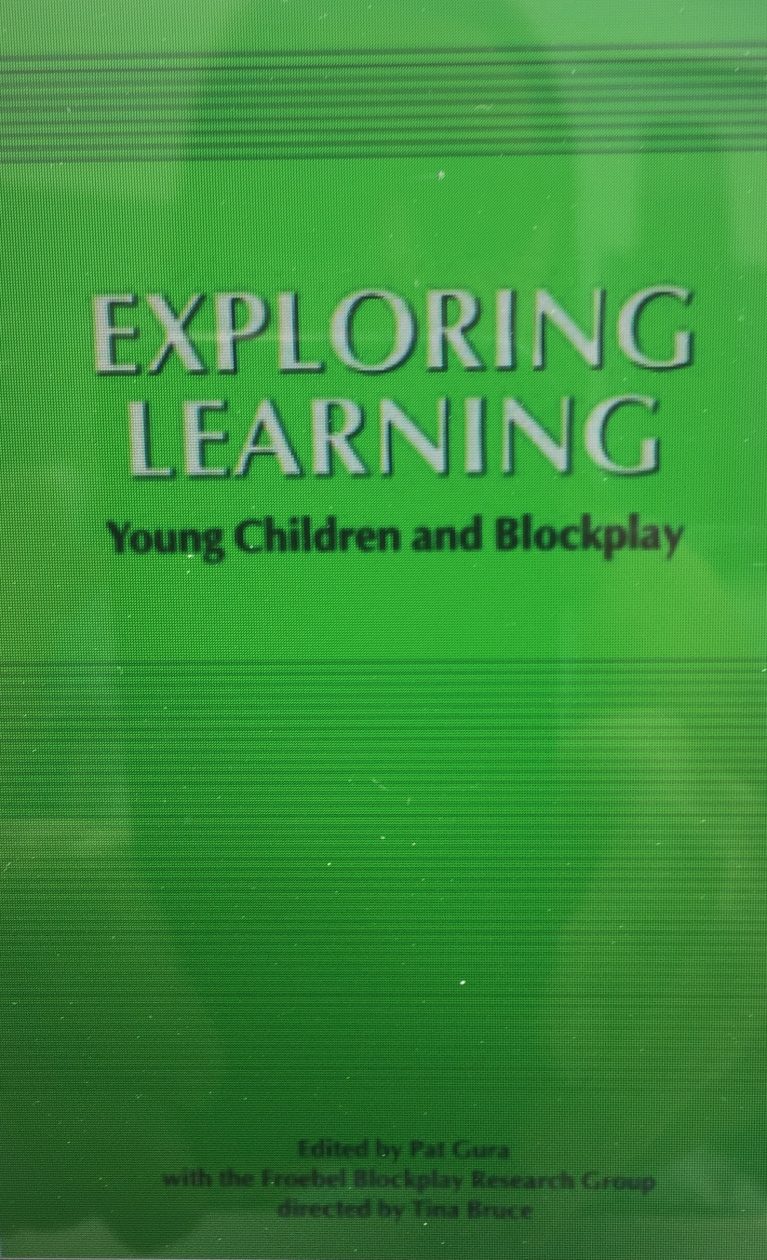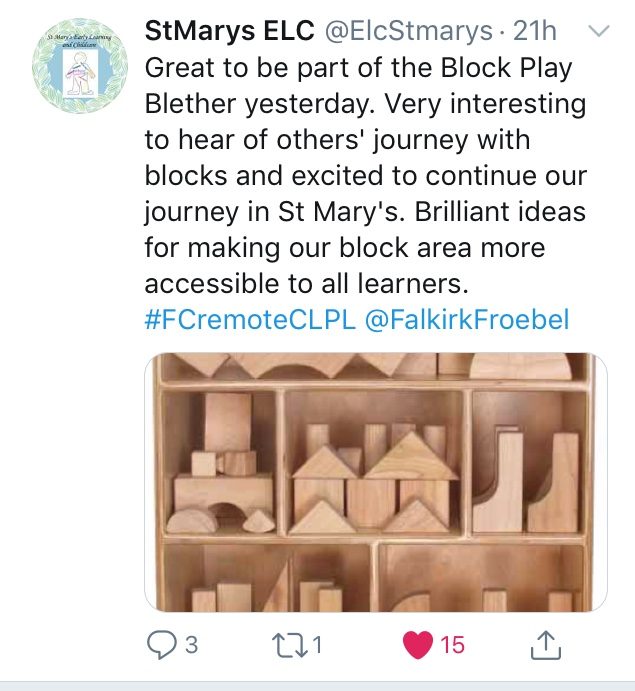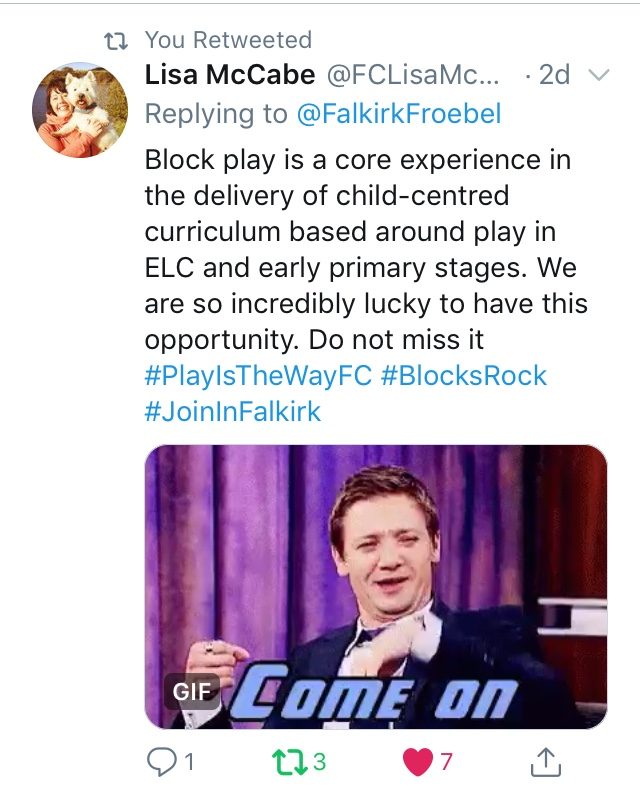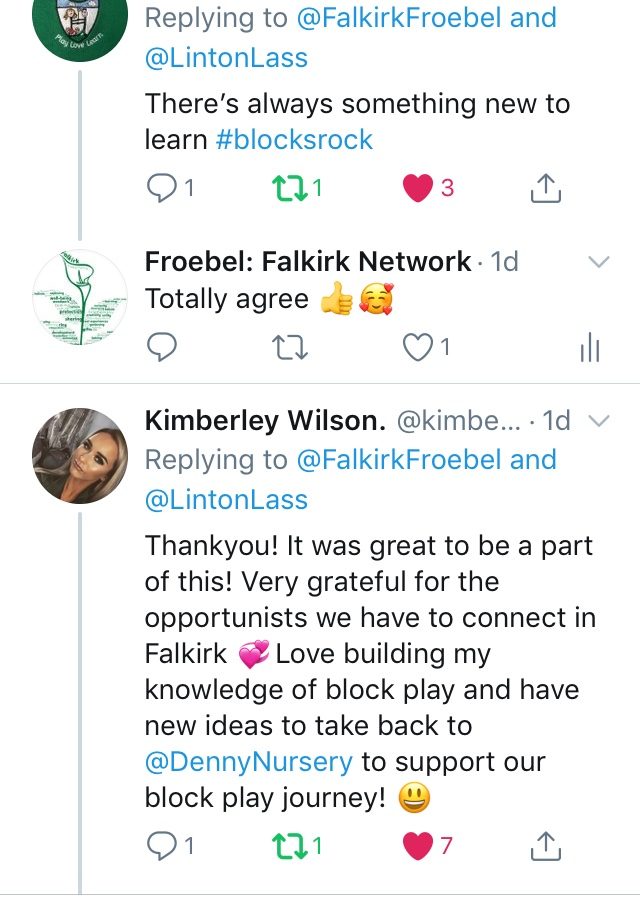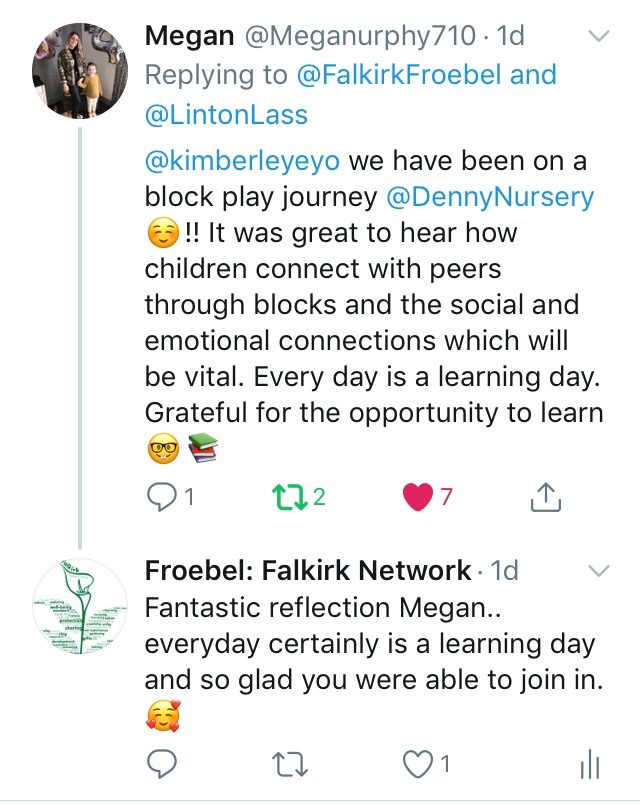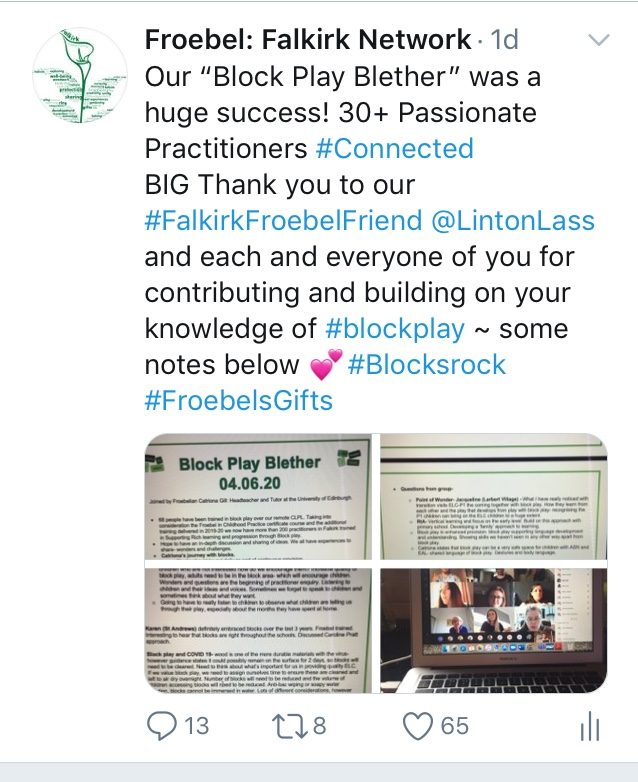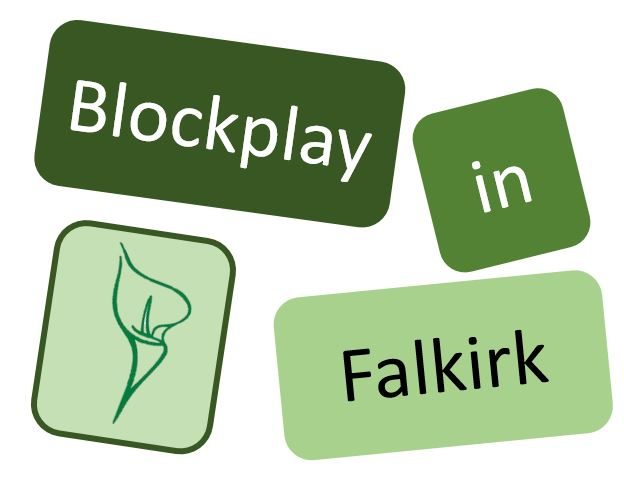 Block Play in Falkirk
Block Play in Falkirk
Click here to access our Block play information and resources (this is available only to Falkirk staff and will require a Glow account to access) where you will find key guidance which will support rich learning and progression through block play. There is also a range of resources to support block play in practice e.g. naming blocks, adult questioning, 7 stages of block play and various others to increase educators knowledge of block play which will support children’s block play in practice and the progression of learning.
This also includes wonderful examples from practitioners Froebel projects from studying Froebel in Childhood Practice Certificate course through the University of Edinburgh.
*Falkirk Council Early Years / Early Level Practitioners or any Falkirk Council Educators who would like to learn more about block play. If you wish to complete remote Block play CLPL please click on the guidance below and follow the step by step guide. The Click the hyperlink above will take you in to access a power point and various other supporting documents. The training resources from community playthings below would also be very beneficial.
CPD remote Block play Guidance
Rich block play does not just occur it develops when the adult acts as a powerful catalyst working hard to enable it. (Bruce, in Gura 1992: 26)
See the fabulous Froebel Trust Froebel Gifts and Block Play Today Pamphlet by Jane Whinnett Froebel’s Gifts and Block Play Today
https://www.froebel.org.uk/uploads/documents/Froebels-gifts-and-block-play-today.pdf
The Froebel Trust have a wonderful Celebration of Block webinar, if you would like to find out more about manful block play please please click the link to view: https://www.froebel.org.uk/training-and-resources/webinars-and-short-films
The fabulous Realising the Ambition: Being Me 2020 Block Play supporting materials have become available through Education Scotland: Being Me through Block Play. Please click the link to access these wonderful resources. Credit to Catriona Gill and Lynn Taylor.
https://wke.lt/w/s/SsWnBv
“Simple playthings that allow children to feel and experience, to act and represent, and to think and recognise.” (Froebel, cited in Brosterman 1997:51)
Blocks that we would recommend to purchase are hollow block, unit blocks and mini blocks if possible – if you are starting off you may need to buy one set and build on this – remember its important to enable enough space for the volume of block you have and that they are in an organised naming system to support children knowing where to find the blocks and where to return the blocks.
All blocks are available to purchase from Community Playthings. www.communityplaythings.co.uk
The following Community Playthings links below will provide you with useful supporting resources.
https://www.communityplaythings.co.uk/learning-library/training-resources
Please collaborate and share your block play journey as we learn together and support our children’s progressions of learning through block play. Share tweets by adding @FalkirkFroebel #blocksrock
It would be wonderful if our Educators could reflect on your personal learning journey with block play. There have been so many fantastic stories shared already through building capacity of our own knowledge, then seeing the extremely positive benefits this is having in practice for our children. It would be great if someone would like to write a blog on this. Please share if you would be interested.

Block Play Blether
04.06.20
Joined by Froebelian Catriona Gill: Headteacher and Tutor at the University of Edinburgh.
KEY POINTS
-
To date 68 Falkirk practitioners have been trained in block play through our remote learning CLPL. Taking into consideration the completion of studying through the University of Edinburgh: Froebel in Childhood Practice certificate course and the additional CPD delivered in 2019-20 via our Falkirk Froebel Family CLPL we now have more than 200 practitioners in Falkirk trained in Supporting Rich Learning and Progressions through Block play.
-
Our block play blether enabled in-depth discussion and sharing of ideas. We all have experiences to share- wonders and challenges.
-
Catriona’s journey with blocks.
-
Blocks should be out daily as part of continuous provision.
-
Blocks began with first nursery experience.
-
Now always have blocks in each setting from then on.
-
Falkirk has a huge commitment to block play.
-
Block play has been around for a very long time.
-
-
Learning from Block Play.
-
Hugely important resource provides for half of the curriculum.
-
Need to observe blocks more widely- covers a range of different outcomes and experiences across the breadth of the curriculum.
-
We don’t need to always note what we see- take the time to go a little deeper.
-
Thinking about children’s symbolic representation- children have thoughts and feelings inside themselves and they express this outwardly.
-
Computational thinking- logic in how children learn.
-
Mathematical development– children see unity and connection in the shape of the blocks.
-
The way blocks are displayed show the difference between the different properties of the blocks.
-
Every part of maths can be explored through block play apart from time.
-
Measuring tapes, making height charts, conversations around standard units enhance the experiences.
Language and Creative Development:
-
Conversations around creations.
-
Later stages are high level of development through play with their designs, negotiate with others, explore ideas and opinions of others.
Physical development:
-
Hollow blocks develop core strength, rotator cuff muscles, etc will develop fine motor skills related to writing in later years. Large hollow blocks lend themselves to gross motor play.
Stages of block play:
-
Not to think about completing a stage and moving on.
-
More of a developmental process. Children can move forwards and back through these stages.
-
Talk to children in appropriate ways- earlier stages- not to ask what you have made? as they are exploring.
-
Our role is not to push children to the next stage- it is about supporting them. It is not a linear process- it is like a “dance” between the stages.
-
-
Questions from group-
-
Point of Wonder- Jacqueline (Larbert Village) – What I have really noticed with transition visits ELC-P1 the coming together with block play. How they learn from each other and the play that develops from play with block play- recognising the P1 children can bring on the ELC children to a huge extent.
-
RtA- Vertical learning and focus on the early level. Build on this approach with primary school. Developing a ‘family’ approach to learning.
-
Block play in enhanced provision- block play supporting language development and understanding. Showing skills, we haven’t seen in any other way apart from block play.
-
Catriona states that block play can be a very safe space for children with ASN and EAL- shared language of block play. Gestures and body language.
-
Reflective question- what skills may children be developing?
-
Lisa Boa- (EY Pedagogue: Bainsford) A little bit of inspiration to see the full benefits of block play. If you have children who are not interested how do we encourage them? Increase quality of block play, adults need to be in the block area- which will encourage children. Wonders and questions are the beginning of practitioner enquiry. Listening to children and their ideas and voices. Sometimes we forget to speak to children and sometimes think about what they want.
-
Going to have to really listen to children to observe what children are telling us through their play, especially about the months they have spent at home.
-
-
Karyn O’Donnell Meza (St Andrews) definitely embraced blocks over the last 3 years. Froebel trained. Interesting to hear that blocks are right throughout the schools. Discussed Caroline Pratt approach.
-
Block play and COVID 19- wood is one of the more durable materials with the virus- however guidance states it could possibly remain on the surface for 2 days, so blocks will need to be cleaned. Need to think about what’s important for us in providing quality ELC. If we value block play, we need to assign ourselves time to ensure these are cleaned and left to air dry overnight. Number of blocks will need to be reduced and the volume of children accessing blocks will need to be reduced. Anti-bac wiping or soapy water solution, blocks cannot be immersed in water. Lots of different considerations, however we need to await guidance from Scot Gov and our authorities before we can make final decisions.

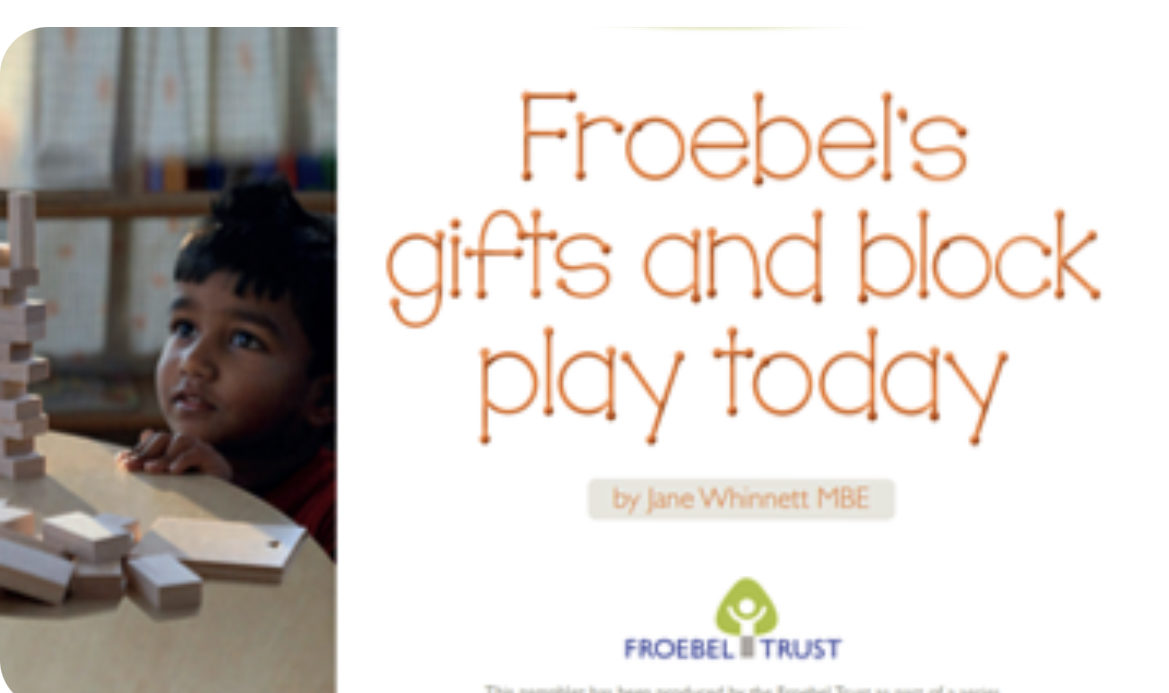
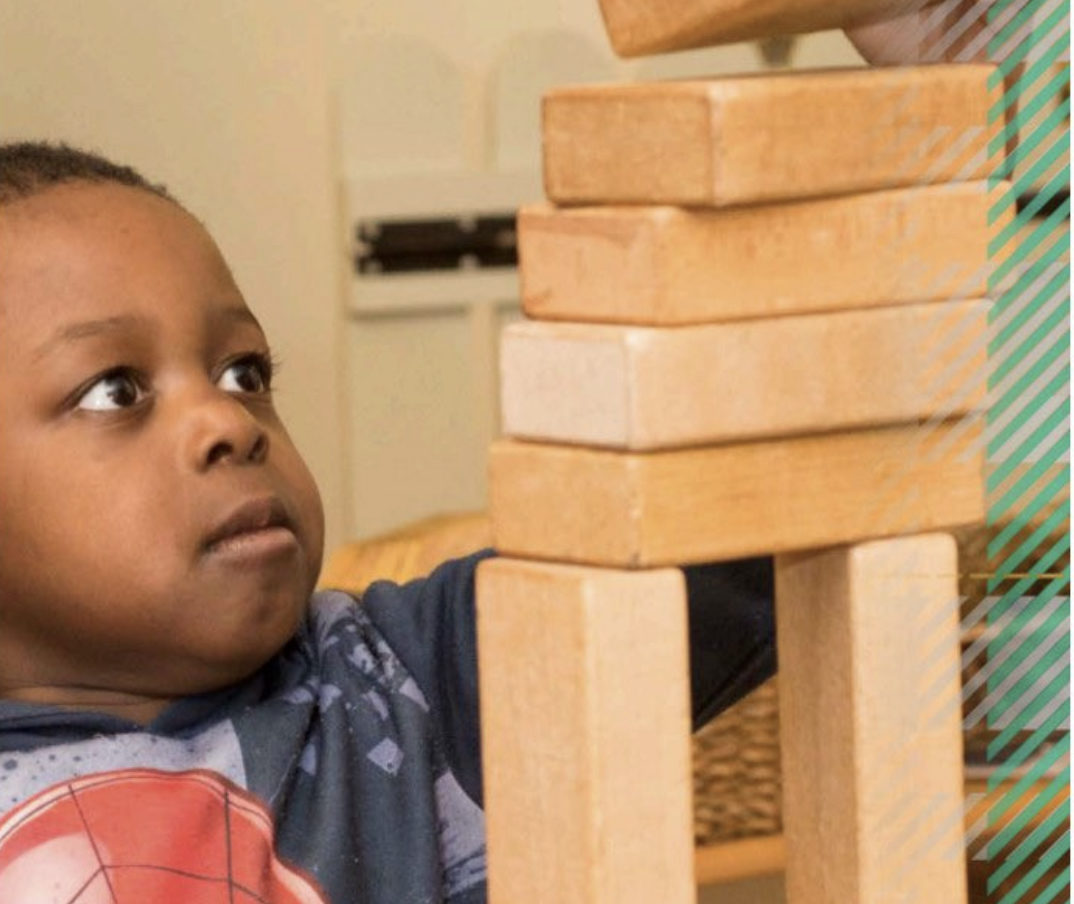
 Download (2.31mb)
Download (2.31mb)





